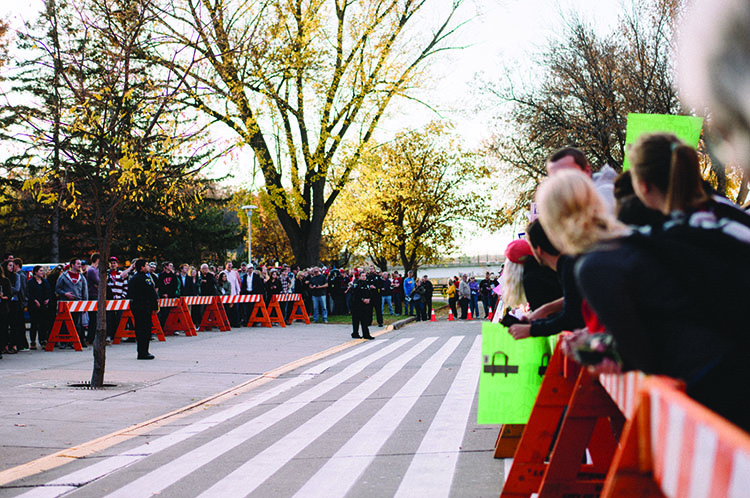As election goes down to the wire, Trump fires up local supporters at Zorn Arena
GOP nominee challenges systematic ‘corruption,’ promises to ‘drain the swamp’
More stories from Gabriel Lagarde
Riding a revitalized voter base surging in the wake of more leaked Hillary Clinton emails, Donald Trump entered Zorn Arena Tuesday night and gave a rousing push to turn Wisconsin red for the first time in over 30 years.
Trump supporters were already trickling into campus early Tuesday morning. By late afternoon, a line stretched down Garfield Avenue and through campus, enough people to pack Zorn Arena’s 3500 person max capacity and still leave throngs waiting outside when the rally began around 6 p.m.
In the opening moments of the rally, republican figureheads — who included former New York City Mayor Rudy Giuliani, Senator Ron Johnson and RNC Chairman Reince Priebus — praised Wisconsin’s pivotal value as a prominent swing-state in the coming Nov. 8 election, one that hasn’t backed a Republican presidential candidate since 1984, the height of the Reagan years.
But if Republicans have it their way, Wisconsin will not be the foregone conclusion it has been the last seven elections, just as the outcome of the presidential election shapes up to be far less certain than it was only days ago.
Trump began his speech by attacking Clinton on a familiar topic: shady emails, one that has gained new life — and given Trump’s campaign new life — with FBI Director James Comey’s recent announcement the bureau would reopen its investigation into Clinton’s bevy of private emails.
In front of a packed Zorn Arena filled with his supporters, Trump painted it as a moment of triumphant vindication.
“This is the biggest scandal since Watergate,” Trump said. “Now it’s been reported there are FBI inquiries probing virtually all of Hillary Clinton’s inner circle. She wants to blame everyone else for her mounting legal troubles, but she has no one else to blame but herself.”
For the majority of his speech, the GOP nominee covered well-charted territory, taking aim at a number of his favorite targets.
True to form, Trump characterized the media as establishment shills, the Affordable Care Act as a resounding failure, the NAFTA treaty as a catastrophe, most elected officials as unfit for their jobs, Hillary Clinton as a habitual liar and the current state of industry as “the death of American prosperity.”
This was all packaged under a theme of rampant corruption in the highest echelons of government, a problem Trump promised to tackle when he ascends to the presidency.
“When we win on Nov. 8, we are going to Washington D.C. and we are going to drain the swamp,” he said.
Trump also spoke on the vulnerability of children of minority descent. He described the situation of African-American and Hispanic children, in which 43 and 32 percent live below the poverty line respectively, as “unacceptable” and promised he would “fix” the systemic problem.
The Republican candidate also promised to suspend the influx of Syrian refugees and returned to his stance on illegal immigration, vowing to end sanctuary cities and doubling down on his initiative to build a wall across the United States-Mexican border.
“Oh, don’t worry,” he said. “We’re going to build it.”
In his closing remarks, Trump’s tone took on an optimism that contrasted strikingly with his typically bleak portrait of American affairs.
“Everyone says to us to think small, wants us to think things can’t change and wants our lives to revolve around Washington D.C.,” Trump said. “I am asking you to dream big, to push for bold change and to believe in a movement powered by the people and their love for this great country.”
Trump’s message and position as an anti-establishment candidate, however controversial, inspired two previously undecided voters to weather the more than three-hour wait for admittance into Zorn Arena.
Jack Kramer, a freshman marketing student, said he identifies himself as a centrist and initially supported Gov. Scott Walker’s presidential bid, but has sided with Trump in opposition to what he considers criminal behavior on Clinton’s part.
“I’ve found myself leaning towards Trump,” he said. “I’ve had these debates myself. I feel like I can look past a few name callings and everything like that, to see where the future of our country should be.”
Joe Tyborski, a Wausau resident and marine veteran, said Trump and his willingness to tackle difficult, relevant issues prompted Tyborski to vote for the first time.
“It took me almost fifty years to realize how our country has gone downhill,” Tyborski said. “It’s time for a change. Up until this election, I didn’t know who I was. I was undecided. His message, it just rings in my mind and my heart and my soul.”
According to the Trump campaign website, Trump traveled to Florida Wednesday to headline events in Miami, Orlando and Pensacola throughout the day.

